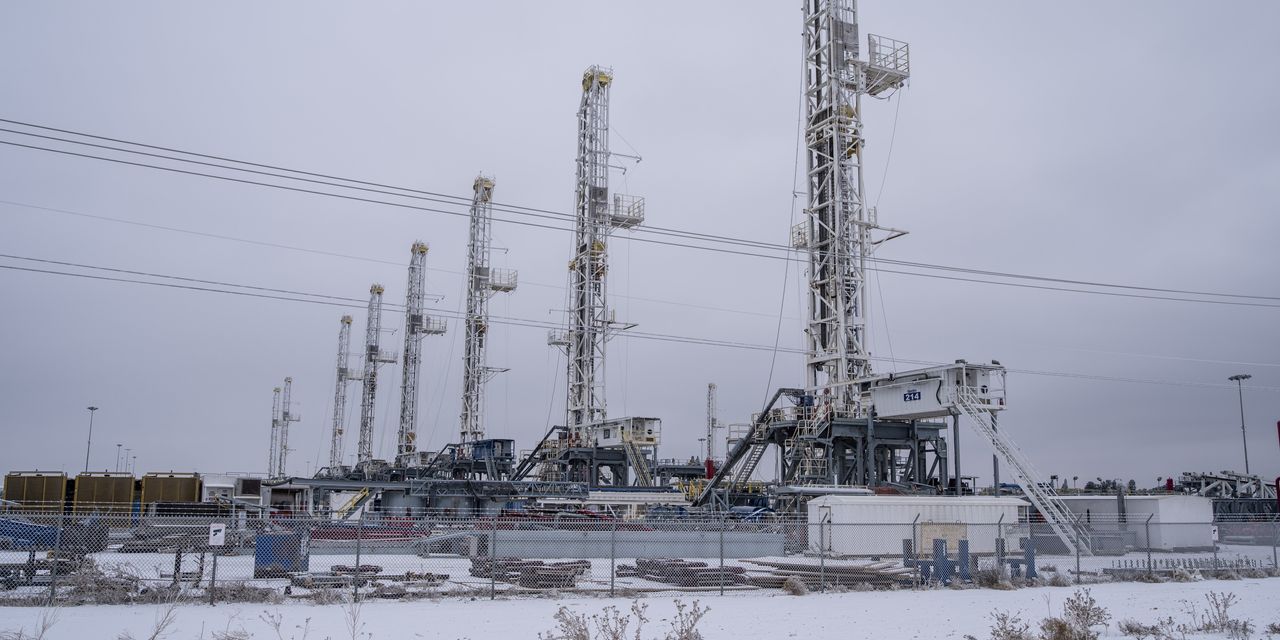
Will the U.S. run out of gas this winter?
The answer is almost certainly “no,” but the rest of the world might not be so fortunate. Now that the U.S. has become a major liquefied natural gas exporter, it can play a big role in making sure other countries have enough. Or it can keep some of that gas at home if domestic natural gas prices, already at their highest since the 2014 polar vortex, spike further.
If it did so, the ensuing tussle could get nasty, denting America’s reputation as a reliable supplier. Almost a decade ago, long before the U.S. became a major LNG exporter, industrial users—including Dow Chemical and steelmaker Nucor—pre-emptively called for export curbs to make sure domestic users had access to cheap and abundant gas. Suppliers countered, saying that the U.S. could pump the commodity rapidly enough to meet both export and domestic demand.
A cold winter could challenge the suppliers’ assumption. With domestic inventory below five-year average levels, U.S. benchmark gas prices have already doubled from a year earlier, recently nearing $6 per million British thermal units.
That is nothing compared with East Asia and Europe, where prices are about five times as high well before the first snowflake. The supply crunch comes at a time when the U.S. is exporting more natural gas—supercooled and liquefied to be carried to destinations abroad—than ever before. If supplies merely get stretched domestically then U.S. customers might need to pay a similarly shocking sticker price. Making matters worse, U.S. natural gas producers are in no rush to drill for more gas after getting burned by previous sprees that left them saddled with debt. Coal, which can step in to replace natural gas for power generation, is also in short supply.
Grumbling is already starting. Two weeks ago, a trade group representing manufacturers sent a letter to Energy Secretary Jennifer Granholm urging “immediate action” to reduce LNG exports, saying manufacturers can no longer compete in the market if natural gas prices surge. That dynamic has already played out in Europe, where soaring energy prices have prompted some steelmakers and fertilizer plants to halt production. An LNG industry group countered with a letter asking Secretary Granholm for continued support on LNG permits and approvals, saying that exports stabilize and incentivize U.S. production.
Don’t stock up on firewood—a cold winter is unlikely to threaten Americans’ home heating needs, says Richard Redash, head of global gas planning at S&P Global Platts. But price spikes are certainly possible.
A rough back-of-the-envelope calculation shows that, if the U.S. were to stockpile natural gas inventory at the five-year average pace, it would have slightly over 3.5 trillion cubic feet in storage by early November when the heating season begins. If the winter turns out to be as severe as that of 2013-2014, U.S. inventory levels could get as low as a trillion cubic feet by mid-to-late February. Historically, inventory close to that level has prompted panic buying. From late September 2013 to the height of the price spike in February 2014, for example, natural gas prices rose 73%. Back then, the lower 48 states in the U.S. didn’t export any LNG. Today, the U.S. exports about 10% of its production.
If push came to shove, could the U.S. halt exports, at least temporarily? Bob McNally, president of Washington, D.C.-based consultancy firm Rapidan Energy Group, notes that President Joe Biden has the authority to do so if he declares an emergency, though “in an emergency it almost doesn’t matter” if it is legal, he said.
Mr. McNally said an export ban is unlikely, but he wouldn’t rule it out completely, adding that “few things terrify American presidents more than soaring energy prices,” especially when inflation is already elevated. In February, Texas Governor Greg Abbott asked LNG exporters to limit intake of the fuel and ordered natural gas producers not to export the fuel out of the state during the state’s deep freeze.
Curbs would prove detrimental to America’s reputation as an energy exporter, though, affecting developers’ ability to sign new contracts around the world. Many importers are utilities with an obligation to make sure consumers in their respective countries have access to heat and electricity. Failing to send promised LNG cargo at the height of winter could prove calamitous.
That context is important as the growth outlook for U.S. natural gas depends heavily on overseas demand. Domestic natural gas consumption is slated to grow at a sleepy average annual rate of 0.7% from 2020 to 2024, while the Asia Pacific region, a prodigious importer, is expected to see average growth of 4.5%, according to the International Energy Agency. U.S. gas production growth will be “driven mainly by the country’s growing LNG export capacity,” IEA wrote in its report.
The same question could surface in future years too. The major difference between the U.S. and the two other major exporters—Qatar and Australia—is that the U.S. is also a large consumer of its own natural gas. The more export capacity the U.S. adds, the more likely it is to face pressure domestically to keep the fuel at home whenever price spikes do occur.
Curbing exports would backfire in another way: Domestic drilling would suffer if export demand became uncertain, possibly leading to higher U.S. prices in the long run. It could be a very expensive way to lower energy costs.
Write to Jinjoo Lee at [email protected]
Copyright ©2021 Dow Jones & Company, Inc. All Rights Reserved. 87990cbe856818d5eddac44c7b1cdeb8







